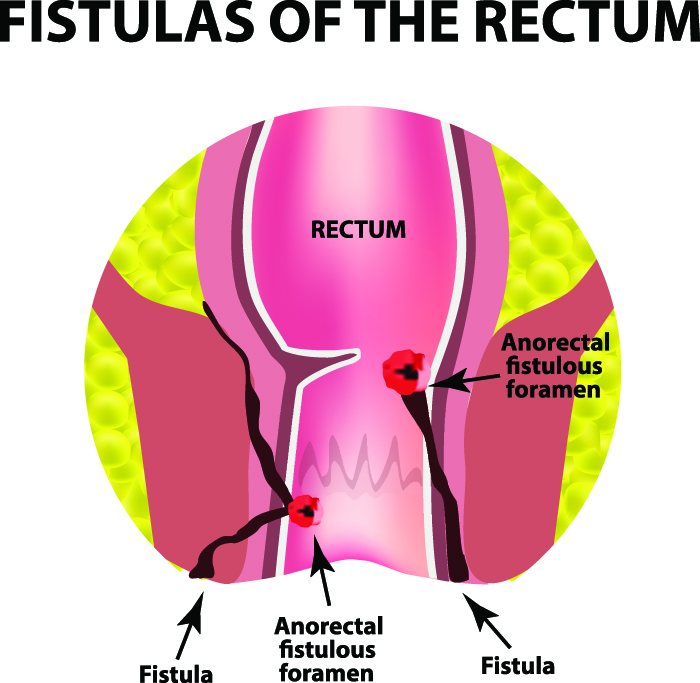Fistula Treatment & Diagnosis in Chunni Ganj, Kanpur
Fistula
A fistula is an abnormal passage between two organs that are not connected usually. It can develop anywhere in the body such as between the vagina and the rectum, anus and the rectum, intestine and the skin, rectum and the skin, etc.
What is a Fistula?
A fistula is a connection formed between the two parts that are not connected normally. The most common type of fistula is around your anus and skin.

What Are the Types of Fistulas?
The different types of fistulas are:
Anal fistula
It is an abnormal passage formed between the anal canal and the skin. It is the most common type.
Anorectal fistula
This type of fistula is formed between the anal canal and the skin around the anus.
Rectovaginal fistula
It is a type of fistula formed between the rectum and vagina.
Anovaginal fistula
This type of fistula is formed between the anus and vagina.
Colovaginal fistula
An opening or connection is formed between the colon and the vagina.
Urinary tract fistulas
When an abnormal connection is formed between the urinary organs and any other organ it is called urinary tract fistulas.
Vesicouterine fistula is formed between the bladder and the uterus.
A vesicovaginal fistula occurs when there is a connection form between the bladder and the vagina.
A urethrovaginal fistula occurs between the urethra and the vagina.
Other Types of fistulas
Enteroenteral fistula: It is an opening formed between two parts of the intestine.
Enterocutaneous or Colocutaneous fistula: It is formed between the small intestine and the skin or the colon and the skin.
If the fistula is not treated, it can cause discomfort and can produce harmful effects on your body.
Untreated fistulas can cause infection, damage to the nerves, and kidney failure.
What Are The Causes of a Fistula?
The different causes of fistula are:
- Childbirth and obstructed labor
- Crohn’s disease and diverticular disease
- Radiation therapy increases the risk of fistulas
What Are The Symptoms of Fistulas?
The symptoms of fistulas depend on the type. Some common symptoms of fistulas are:
- Leaking of urine from the vagina
- Irritation of the genital organs
- Repeated infection of the urinary organs
- Leaking of gas and feces from the vagina
- Drainage of foul-smelling fluid from the vagina
- Nausea
- Vomiting
- Diarrhea
- Pain in the abdomen
- Irritation
What Are the Treatment Options For Fistulas at Apollo Spectra, Kanpur?
For seeking the best possible treatment, you should consult with a doctor. After diagnosing the type of fistula, the medical professional will decide the best treatment plan. A simple treatment plan may include controlling the symptom using medications. A severe fistula may require surgery. If you have any of the symptoms, you should discuss them with a doctor as quickly as possible.
Request an appointment at Apollo Spectra Hospitals, Kanpur
Call 1860-500-2244 to book an appointment
How You Can Prevent Fistulas?
Fistulas can be prevented. Some ways by which you can prevent fistulas are:
- Eating a healthy diet is a good way to prevent fistulas
- Avoiding smoking helps to promote quick fistula healing
- Regular exercise also helps to prevent fistulas
- Eating a fiber-rich diet will prevent constipation and helps to prevent fistulas
- Avoid straining when passing stool
- Try to keep the anal area clean and dry
- You can also take a sitz bath to get relief from the discomfort
Conclusion
There are about 50,000 to 100,000 new cases of fistulas every year throughout the world. In Africa and some other countries, fistulas are not addressed due to poor obstetric care.
Prevention can help in reducing the chances of fistulas. Consult with a health care professional if you notice any symptoms for proper management and care.
Fistula if not treated can cause many complications. It can cause discomfort and some fistulas can cause infection and a serious condition called sepsis. Many treatment options are available for fistulas so that complications do not occur.
A fistula can rarely cause cancer. But, if a fistula is not treated for a long time it can lead to cancer.
In some cases, the fistula closes for a short time but it reopens again. So, a fistula cannot heal on its own. You should consult with a doctor for getting the right treatment.
Symptoms
Our Top Specialities
NOTICE BOARD
CONTACT US
CONTACT US
 Book Appointment
Book Appointment


.svg)
.svg)
.svg)
.svg)








